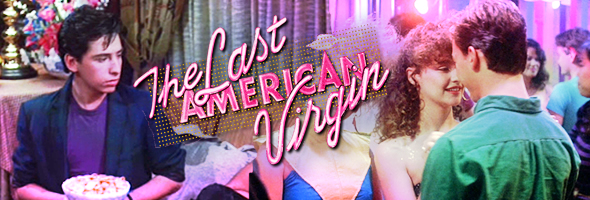
Color, 1982, 93m.
Directed by Boaz Davidson
Starring Lawrence Monoson, Diane Franklin, Steve Antin, Joe Rubbo, Louisa Moritz, Brian Peck, Kimmy Robertson
Arrow (Blu-ray & DVD) (UK RB/R2 HD/PAL), MVD Visual, Olive Films (Blu-ray) (US RA HD), MGM (DVD) (US R1 NTSC), Universum (Germany R2 PAL) / WS (1.85:1) (16:9)

Easily one of the more memorable entries in the teen sex comedy wave of the early '80s, The Last American Virgin is a highly unusual and pivotal entry in the story of Cannon Films, a name familiar now to any cult movie fan. Brought to American shores by Israeli filmmakers Menahem Golan and Yoram Globus, Cannon started inauspiciously with films like The Apple and New Year's Evil but soon became a familiar producer of sci-fi, action, and occasional prestige films (such as Runaway Train). However, this particular film is the most direct link to the owners' Israeli roots as it's also a very close remake of one of the country's most successful cinematic exports, 1978's Lemon Popsicle, which inspired a string of sequels and imitators. The original film was successful in Asia and Europe as well but, due to its downbeat ending, failed to find a release in America. The film's director, Boaz Davidson, 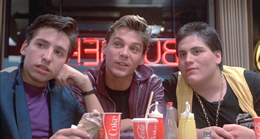 was brought back to helm this English version (just after another Cannon project, X-Ray, a.k.a. Hospital Massacre), which replaces the original's golden oldie jukebox soundtrack of '50s and early '60s ditties with a great '80s pop concoction featuring recent hits by bands like The Police, The Waitresses, The Cars, Blondie, Devo, and REO Speedwagon. The end result is far more worthwhile than most critics acknowledged at the time, a bizarre and surprisingly fearless look at the pains of adolescence and sexual awakening mixed with enough raunchy humor to keep the kids in their seats.
was brought back to helm this English version (just after another Cannon project, X-Ray, a.k.a. Hospital Massacre), which replaces the original's golden oldie jukebox soundtrack of '50s and early '60s ditties with a great '80s pop concoction featuring recent hits by bands like The Police, The Waitresses, The Cars, Blondie, Devo, and REO Speedwagon. The end result is far more worthwhile than most critics acknowledged at the time, a bizarre and surprisingly fearless look at the pains of adolescence and sexual awakening mixed with enough raunchy humor to keep the kids in their seats.
In a Los Angeles neighborhood, good guy Gary (Friday the 13th: The Final Chapter's Monoson) spends his days at school or working for a pizzeria and evenings with his best friends, smooth talker Rick (The Goonies' Antin) and chubby peacekeeper David (Rubbo). Gary develops a crush on pretty Karen (Franklin), but before he can successfully ask her out, she winds up dating Rick -- who doesn't seem to have any intention of staying faithful. The first hour of the film is essentially a plotless string of vignettes with the friends experiencing sexual misadventures involving fake cocaine, angry parents, a Spanish nymphomaniac, an outbreak of crabs, uncooperative brassieres, and other pitfalls of adolescence. However, the stakes are eventually raised considerably when Karen finds herself in trouble and turning to Gary for help, which sets off an unpredictable chain of events. 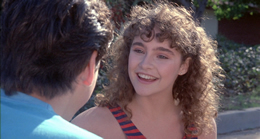
It wouldn't be fair to say more for fear of spoiling the film for new viewers, but the kick in the teeth this film ultimately delivers caused it more than a few problems at the box office. However, it's that same unflinching, candid resolution that made this one of the most longstanding favorites of its kind, rising far above the other films churned out in the wake of Fast Times at Ridgemont High and Porky's (both of which this resembles at times in the early going, despite the fact that it was actually shot before either one was released). It also doesn't hurt that it also works as a great vehicle for Franklin, one of the greatest cult movie crushes of the era thanks to her roles in Better Off Dead, Amityville II: The Possession, TerrorVision, and Bill & Ted's Excellent Adventure, among others. It's hard to believe that this was her debut feature given the places she has to go in the final third; in fact, her last, dialogue-free scene is now impossible to imagine with any other actress.
If all this sounds kind of heavy, well, much of the film definitely isn't. The comedy scenes are rambunctious and intentionally juvenile, exactly the kind of silliness that kept this in heavy rotation on TV over the years where it ensured future generations of fans. The busty Louisa Moritz, a veteran of New Year's Evil and Death Race 2000, has a particular standout bit as the promiscuous Carmela, while the now infamous locker room measuring scene is something you'd probably never see on a movie screen today outside of Jackass, for better or worse. In fact, the pretty frank depiction of sexuality (including one squirm-inducing encounter with a prostitute) is way out of line with teen films today; this is a heck of a lot closer to Spetters at times than successors like American Pie. 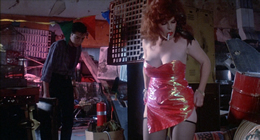
Perhaps due to issues with its dense pop soundtrack, this one took longer than usual to hit DVD from MGM, caretakers of most of the Cannon library. It first came out in 2003 and was later reissued as a double bill with Losin' It, then in a couple of '80s-themed multi-packs alongside titles like Valley Girl, The Sure Thing, and Class. In America it never got anything more lavish than a trailer in terms of special features, but fortunately that's more than corrected with the 2013 British edition from Arrow Films in a dual-format edition with both a Blu-ray and DVD. As with most MGM-controlled Cannon films, the elements have been kept in immaculate shape and lend themselves well to HD in every respect. The Blu-ray looks terrific with lots of electric '80s colors all over the screen, and the film's bright, sunny texture keeps any potential film stock problems at bay. The lossless PCM stereo soundtrack sounds very good; some of the sound mixing isn't the most sophisticated in the world, but this shows it off to its best advantage with the songs popping through nicely. Optional English subtitles are also included.
The featurettes launch with the 36-minute "The First American Remake," an interview with Davidson about his rise as a filmmaker in Tel Aviv, the story behind the making of Lemon Popsicle (based on his own growing experiences), and which character he sees as himself (which shouldn't be much of a surprise). It gets surprisingly emotional at times, especially at the end when he talks about showing this film to the real-life inspiration for the character of Karen. He also discusses some minor changes the MPAA required to get an R rating, such as imposing a keyhole frame over the most troublesome scene. Monoson comes next with "Memories of a Pizza Boy," running 26 minutes, in which he only briefly touches on the rest of his career and goes into depth about the making of this film. He still has a lot of affection for it, obviously, and some of his stories are great, particularly talking about how Antin prepared for his big sex scene with Moritz and the unusual circumstances of that aforementioned locker room scene. He also reveals the one shot in the film he doesn't like, which actually makes sense.
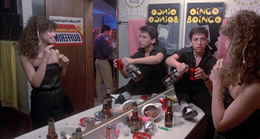 Of course, this release couldn't be complete without Franklin, who is still charming and enthusiastic when talking about her films. In the 20-minute "Babe of the Eighties," she hones it entirely on this film, revealing she's still friends with the great Kimmy Robertson (who plays the geeky Rose and went on to play Lucy on Twin Peaks). She also explains that she couldn't ride a bike, which proved to be a bit of an issue in her first scene, and talks about how she assumed the ending would be changed at some point along the way. It wasn't, obviously, and as anyone who's seen both versions can attest, this Hollywood version is even more uncompromising as it ditches the slight feel-good coda in the Israeli original. Like Davidson, she also talks honestly about her decidedly serious love scene with Antin, which they agree was tough to shoot. Her articulate take on a certain big plot point shared between this and Ridgemont High is perceptive as well, analyzing how her own role differed from what audiences had seen up to that point. (Oh yeah, and buy her book!)
Of course, this release couldn't be complete without Franklin, who is still charming and enthusiastic when talking about her films. In the 20-minute "Babe of the Eighties," she hones it entirely on this film, revealing she's still friends with the great Kimmy Robertson (who plays the geeky Rose and went on to play Lucy on Twin Peaks). She also explains that she couldn't ride a bike, which proved to be a bit of an issue in her first scene, and talks about how she assumed the ending would be changed at some point along the way. It wasn't, obviously, and as anyone who's seen both versions can attest, this Hollywood version is even more uncompromising as it ditches the slight feel-good coda in the Israeli original. Like Davidson, she also talks honestly about her decidedly serious love scene with Antin, which they agree was tough to shoot. Her articulate take on a certain big plot point shared between this and Ridgemont High is perceptive as well, analyzing how her own role differed from what audiences had seen up to that point. (Oh yeah, and buy her book!)
Finally, cinematographer Adam Greenberg appears for the 21-minute "In Praise of Smaller Movies," in which the future lenser of the first two Terminator films and Ghost goes into his early career in low-budget filmmaking including many projects with Davidson. His remarks here are mainly about comparing the two versions, both of which were shot with very low budgets and consist of lots of interiors. It's mostly technical in nature as he talks about working without a tripod and dealing with tricky focus pulling, offering a clear idea of how to pull off a film with creativity and limited resources. The theatrical trailer ("23 Big Hits Recorded in Dolby Stereo!") rounds out the video contents, while the packaging also includes a reversible sleeve containing new artwork and the familiar original poster design along with a booklet (not included as of this writing) with an essay by Robin Bougie and a Calum Waddell interview with enthusiastic fan Eli Roth, plus stills and poster art. The same extras were later ported over for a U.S. edition from MVD Visual, replacing the bare bones one out there from Olive Films .All in all, it's a fantastic tribute to an '80s teen classic that's still surprisingly bold in more ways than one.
Reviewed on September 3, 2013.




 was brought back to helm this English version (just after another Cannon project, X-Ray, a.k.a. Hospital Massacre), which replaces the original's golden oldie jukebox soundtrack of '50s and early '60s ditties with a great '80s pop concoction featuring recent hits by bands like The Police, The Waitresses, The Cars, Blondie, Devo, and REO Speedwagon. The end result is far more worthwhile than most critics acknowledged at the time, a bizarre and surprisingly fearless look at the pains of adolescence and sexual awakening mixed with enough raunchy humor to keep the kids in their seats.
was brought back to helm this English version (just after another Cannon project, X-Ray, a.k.a. Hospital Massacre), which replaces the original's golden oldie jukebox soundtrack of '50s and early '60s ditties with a great '80s pop concoction featuring recent hits by bands like The Police, The Waitresses, The Cars, Blondie, Devo, and REO Speedwagon. The end result is far more worthwhile than most critics acknowledged at the time, a bizarre and surprisingly fearless look at the pains of adolescence and sexual awakening mixed with enough raunchy humor to keep the kids in their seats. 

 Of course, this release couldn't be complete without Franklin, who is still charming and enthusiastic when talking about her films. In the 20-minute "Babe of the Eighties," she hones it entirely on this film, revealing she's still friends with the great Kimmy Robertson (who plays the geeky Rose and went on to play Lucy on Twin Peaks). She also explains that she couldn't ride a bike, which proved to be a bit of an issue in her first scene, and talks about how she assumed the ending would be changed at some point along the way. It wasn't, obviously, and as anyone who's seen both versions can attest, this Hollywood version is even more uncompromising as it ditches the slight feel-good coda in the Israeli original. Like Davidson, she also talks honestly about her decidedly serious love scene with Antin, which they agree was tough to shoot. Her articulate take on a certain big plot point shared between this and Ridgemont High is perceptive as well, analyzing how her own role differed from what audiences had seen up to that point. (Oh yeah, and buy her book!)
Of course, this release couldn't be complete without Franklin, who is still charming and enthusiastic when talking about her films. In the 20-minute "Babe of the Eighties," she hones it entirely on this film, revealing she's still friends with the great Kimmy Robertson (who plays the geeky Rose and went on to play Lucy on Twin Peaks). She also explains that she couldn't ride a bike, which proved to be a bit of an issue in her first scene, and talks about how she assumed the ending would be changed at some point along the way. It wasn't, obviously, and as anyone who's seen both versions can attest, this Hollywood version is even more uncompromising as it ditches the slight feel-good coda in the Israeli original. Like Davidson, she also talks honestly about her decidedly serious love scene with Antin, which they agree was tough to shoot. Her articulate take on a certain big plot point shared between this and Ridgemont High is perceptive as well, analyzing how her own role differed from what audiences had seen up to that point. (Oh yeah, and buy her book!) ![]()